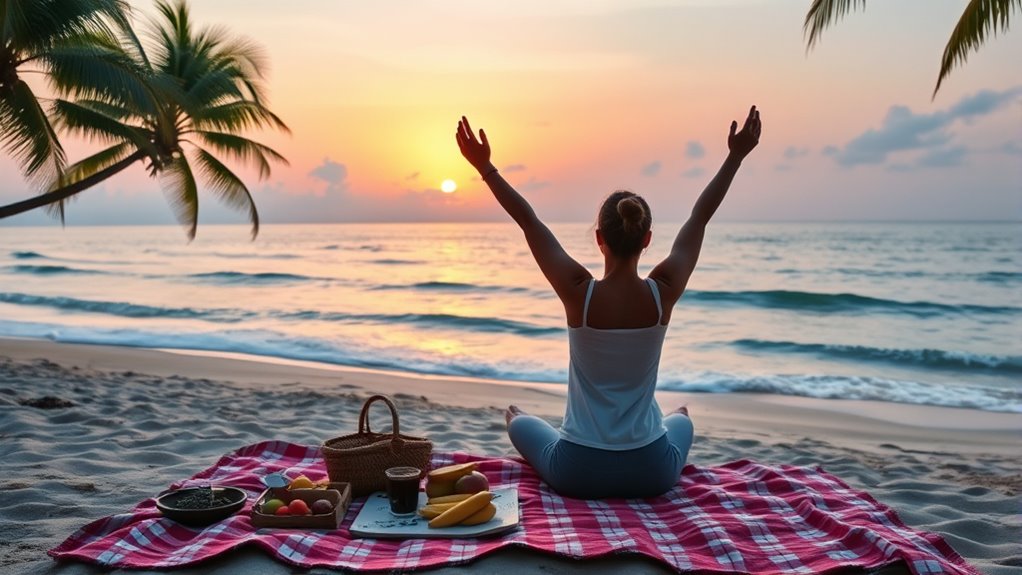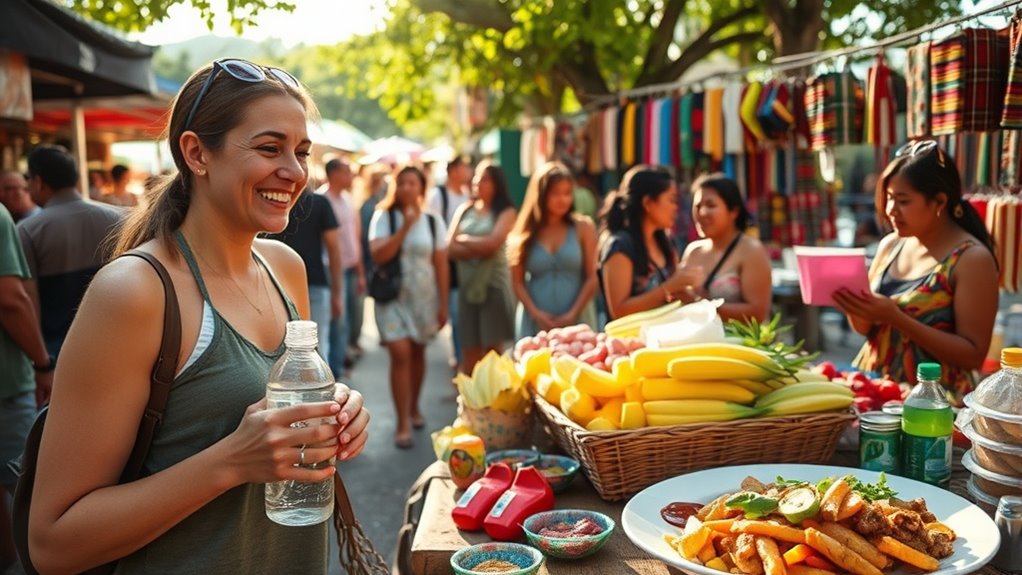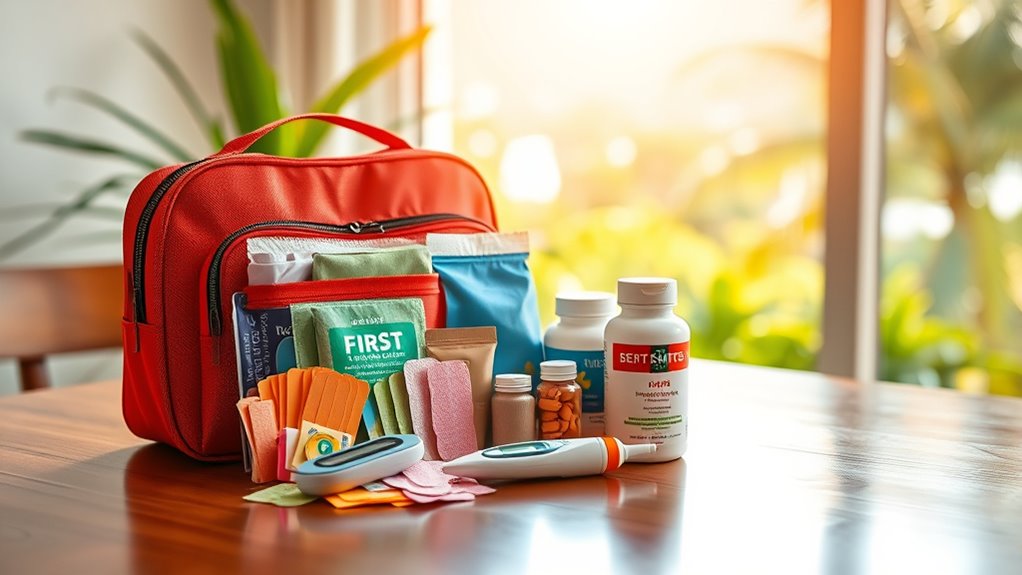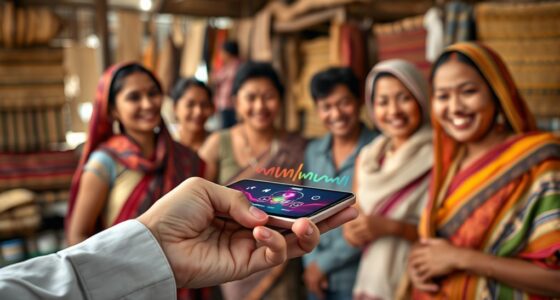To stay healthy while traveling to meet your Filipina, make sure you’re up-to-date on vaccinations and consider getting preventive shots like Hepatitis A. Hydrate well, choosing water over sugary drinks, and pack healthy snacks. Practice good hygiene by washing your hands often and using hand sanitizer. Prioritize your mental health with routines and breaks. Finally, prepare an emergency kit with essential medications and supplies. There’s more to explore on ensuring your wellness during your trip.
Key Takeaways
- Stay updated on vaccinations relevant to the Philippines, like MMR and Hepatitis A, to protect your health during travel.
- Prioritize hydration by drinking plenty of water; carry a refillable bottle to encourage regular intake.
- Practice good hygiene by washing hands frequently and using hand sanitizer, especially in public places.
- Pack a well-stocked emergency kit with essential medications, first aid supplies, and hygiene products for potential health issues.
- Maintain your mental health by engaging in enjoyable activities and establishing a support network while traveling.
Vaccinations and Health Precautions Before Traveling

Before you commence on your journey, have you considered the vaccinations and health precautions necessary for a safe trip?
Have you thought about essential vaccinations and health precautions before starting your journey?
It’s vital to be up-to-date on routine vaccinations like MMR and consider specific ones like Hepatitis A and Typhoid, especially due to food and water risks.
If you’re venturing into rural areas, the Japanese Encephalitis vaccine might be a wise choice during mosquito season.
A pre-travel health assessment can help identify your individual needs—discuss your itinerary with a healthcare provider to tailor your vaccinations accordingly.
Don’t forget to verify you have enough regular prescription medications for your trip and check if your travel insurance covers medical expenses abroad.
Taking these steps can help safeguard your health while traveling.
Smart Eating and Hydration Choices

Staying nourished and hydrated while traveling is essential for maintaining your energy and well-being. Choose water over sugary or alcoholic drinks to stay hydrated. Bring a refillable water bottle to encourage regular intake, especially in hot climates. Incorporate hydrating foods, like fruits and vegetables, into your diet. Fresh fruit juices, such as freshly squeezed juices, can also provide hydration and essential nutrients.
For snacks, pack nutrient-dense options such as nuts, seeds, and dried fruits. Protein-rich snacks like beef jerky or Greek yogurt will keep hunger at bay. Opt for whole-grain sandwiches or wraps to sustain energy.
When dining out, research healthy restaurants and prioritize meals with lean meats and veggies. Moderation is key—eat moderate-sized meals to avoid overindulgence and maintain a balanced diet throughout your trip. Additionally, consider adding fruit juice varieties to your meals, as they can enhance flavor and provide essential nutrients.
Hygiene Practices to Minimize Germ Exposure

Maintaining your health while traveling goes beyond smart eating and hydration choices; hygiene practices play an essential role in minimizing germ exposure.
Start by washing your hands regularly, especially after touching high-touch surfaces. Carry hand sanitizer with at least 60% alcohol for times when soap and water aren’t available.
Wipe down surfaces like airplane armrests and tray tables with disinfecting wipes to reduce exposure. Be cautious in public transport and restrooms; use disposable seat covers and minimize contact with surfaces.
Always handle restaurant menus with clean hands and avoid placing personal items on hotel floors.
Finally, consider wearing a face mask in crowded spaces to further protect yourself from respiratory infections.
Stay vigilant, and you’ll enjoy a healthier trip!
Prioritizing Mental Health and Rest

Travel can be exhilarating, but it often comes with its own set of mental health challenges, making it vital to prioritize your well-being.
Recognizing that anxiety, depression, and substance abuse can affect travelers, especially young adults, is significant. To maintain your mental health, stick to routines like exercise or meditation, and build a support network with locals or fellow travelers.
Engaging in enjoyable activities can enhance your mood, while knowing where to access mental health services provides peace of mind. Remember to monitor your mood and physical symptoms, and take breaks to avoid burnout.
Creating a restful environment will improve sleep quality, so set realistic expectations for relaxation to guarantee a positive travel experience.
Safe Travel Measures to Protect Your Health

Prioritizing your mental health while traveling sets a strong foundation for overall well-being, but it’s equally important to take steps that protect your physical health.
Start by consulting a healthcare provider about necessary vaccinations and medications for your destination. It’s also wise to understand the financial considerations for elderly care to ensure you have adequate resources for any potential health-related expenses. Pack a travel health kit with essentials like hand sanitizer and medications, and consider including items that support auditory processing to enhance communication in new environments. Additionally, being aware of chronic feelings of emptiness can help you recognize when to seek emotional support during your trip. Maintaining a proper diet while traveling can also contribute significantly to your overall health and energy levels, so consider packing nutritious snacks to keep your energy up.
Consult a healthcare provider about vaccinations and pack a travel health kit with essentials like hand sanitizer and medications.
During your journey, wear masks in crowded areas and maintain hand hygiene by washing frequently or using sanitizer. Disinfect items you often touch, and stay aware of your surroundings to avoid crowded places.
Drink plenty of water to stay hydrated and use sunscreen for sun protection. Additionally, practice mindfulness techniques to help manage stress during your travels.
Finally, keep emergency contact information and local healthcare facilities handy in case of unexpected health issues.
Understanding Cultural Sensitivity and Interaction

When you immerse yourself in a new culture, understanding local customs and practices is essential for fostering meaningful interactions and avoiding misunderstandings.
Dress appropriately, especially at religious sites, and respect sacred places by following local rules. Learning basic Filipino phrases can go a long way in showing respect.
Participate in local events and engage in traditional meals to connect with the community. Be mindful of body language and use respectful language to communicate effectively.
Always address elders with proper titles to show deference. Remember, patience and flexibility are key when maneuvering through different cultural norms.
Preparing an Emergency Kit for Your Trip

Understanding local customs and norms helps enrich your travel experience, but it’s also important to be prepared for unexpected situations.
Being aware of local customs enhances your journey, but readiness for surprises is equally essential.
Start by packing your prescription medications, clearly labeled with dosing schedules. Bring pain relievers like acetaminophen or ibuprofen, antihistamines for allergies, and antacids for stomach issues.
Include a first aid kit with bandages, antiseptics, and elasticated bandages for sprains. Don’t forget emergency tools like a mini torch and an emergency whistle.
For infection prevention, pack antibacterial hand sanitizers, wipes, and masks. Finally, include an emergency blanket and a thermometer to monitor your health.
Having these essentials guarantees you can handle minor emergencies and focus on enjoying your trip!
Frequently Asked Questions
What Are the Best Ways to Manage Jet Lag?
To manage jet lag, start by adjusting your sleep schedule a few days before you travel.
Use melatonin to help shift your sleep cycle.
During the flight, stay hydrated and avoid alcohol.
Once you arrive, immediately adapt to the local time and get plenty of morning sunlight.
Try not to nap on your first day, and stick to light meals to ease your stomach.
Keep active, but don’t overdo it!
How Can I Stay Active While Traveling?
Imagine exploring a vibrant city on foot, discovering hidden gems while staying active. To stay fit while traveling, incorporate walking into your daily routine.
Opt for stairs instead of elevators, and seek out local hiking trails or bike paths. You can also join a walking tour to immerse yourself in the culture.
Don’t forget to hydrate and fuel your body with healthy snacks to keep your energy up during your adventures!
What Should I Do if I Get Sick Abroad?
If you get sick abroad, it’s essential to know where to find medical help. Start by locating nearby hospitals or clinics, and don’t hesitate to seek assistance.
Language barriers can be tough, so consider using translation apps for effective communication. Keep your travel insurance handy, as it might cover necessary treatments.
Most importantly, stay calm and follow emergency protocols to guarantee you get the care you need swiftly and safely.
Are There Specific Dietary Restrictions in Filipino Cuisine?
You might think Filipino cuisine is one-size-fits-all, but it actually accommodates various dietary restrictions.
While traditional dishes aren’t typically focused on allergies, awareness is growing, and you’ll find vegetarian and low-sodium options emerging.
Chefs are adapting recipes to cater to health needs, ensuring everyone can enjoy the flavors.
If you’re mindful of dietary restrictions, you can still savor the delicious variety that Filipino food has to offer without compromising your health.
How Can I Connect With Locals for Health Tips?
To connect with locals for health tips, immerse yourself in the community. Attend local health fairs or events where you can meet community health workers.
Don’t hesitate to ask about traditional remedies or nutritional advice during conversations. Share your own health experiences to foster trust and invite feedback.
Learning basic Tagalog phrases can also help you communicate better. Engaging with locals shows respect and opens doors to valuable health insights.
Conclusion
As you begin your journey to meet your Filipina, remember that staying healthy is essential for making the most of your experience. Will you prioritize your well-being and embrace each moment fully? By following these health tips, you’re not just safeguarding your body; you’re setting the stage for vibrant connections and unforgettable memories. So, are you ready to take the leap and guarantee your trip is as enriching as it is exciting?









